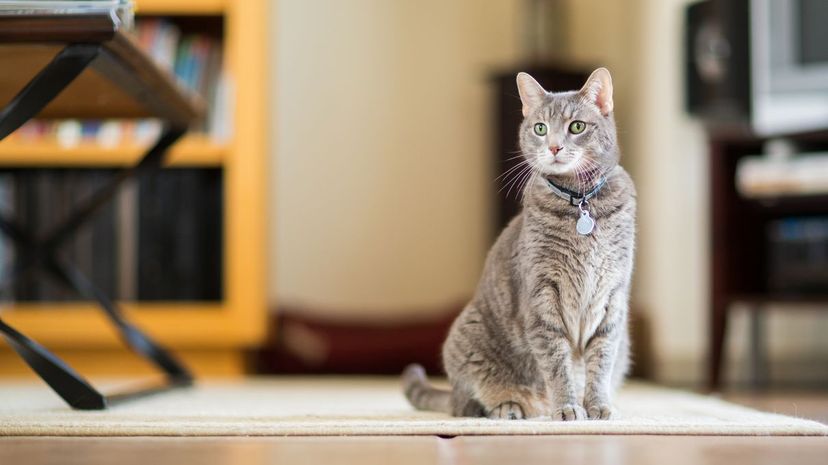
About This Quiz
Rules govern every area of life. From children's sports to driving motor vehicles to paying one's taxes, rules are essential to keeping order and to ensuring clarity. Rules, by definition, apply to everyone ... with a few exceptions. The English language has many rules, but almost all of them can be broken without sacrificing the essential purpose of language: communication. Some of these rules are shaped in the negative. In fact, most of the "rules" of the English language have exceptions, and nearly all of them can and should be broken more often than they can or should be followed. However, those times they should be followed tend to arise more frequently.
English itself is a hodgepodge of pieces of many languages, with many words borrowed from French, Latin, German, and of course, the Anglo-Saxon roots of English. English frequently generates new words, with recent additions arising from the way English is used online and in text message form. Still, the rules remain, and one's knowledge of the rules of English will determine how one is viewed. Facility with English connotes, perhaps unfairly, intelligence, wisdom, and at the very least, eloquence. Are you a master of the English language? Find out now with this quiz!

Though spelled and pronounced the same way, "well" is several words. "Well" can be a verb as in "to well up," a noun as in "drawing water from the well," and an adverb as in "it was done very well." What makes this final part hard to see is it is an adverb that doesn't end in "ly."

One of the first rules one learns in the language is "I before E except after C." This is an example of this rule in action. It should be spelled "received," not "recieved." Of course, more English words break this rule than abide by it.

"What part of the country are you going to?" is an incorrect execution, as "to" should be in the beginning, as it is a preposition. It should read "To what part of the country are you going?"
Advertisement

Of these nouns, only "San Juan Capistrano" is a proper noun, and thus requires capitalisation. Similarly, one should only capitalise "Conservative" with reference to the political party; a person who is "a Conservative." A person who is conservative need not be a member of the Conservative party.

An interjection, in English, usually qualifies as both an "ejaculation" comment ("Wow!" "Crikey!" etc.) and a comment that goes between others. It can be the first alone, but generally not the second alone.

As a matter of pure clarity, here is how to understand this sentence: "For whom" sets up the premise of the question, introducing the reasoning of the question. "Did you" describes the subject. "Get it" describes the object and the relationship of subject and object.
Advertisement

Prepositions indicate relationships. In this case, the preposition shows the relationship between the cat, which is sitting, and the mat. Without "on," this isn't clear. After all, a preposition is a word that governs the relationship of one noun to something else.

This is a very badly worded sentence. It does not make things clear. It could be read to mean that "I went to the clinic" and saw people outside of the clinic, meaning "I" am the only one there. It could say that there were three people at the clinic ("I," Mary, who is a doctor, and John), or four people ("I," Mary, John, and someone else who is a doctor).

While either "was" or "were" are technically correct, and they could mean one thing or the other about one's perceptions of the audience, the convention of referring to an audience as a single unit is much more common in America than elsewhere in the English speaking world. Once again, either use is correct.
Advertisement

The problem with using the passive voice is that it muddies the meaning of the statement. By separating Raj from his act by using vague language, the act itself becomes amorphous, and Raj's role in it becomes unclear.

Subject and object are essential components of English grammar. The object (that is the thing being acted upon) is the face as it isn't doing anything, but rather it is being acted upon.

"Having none" indicates having nothing. A double negative negates itself, meaning that "Ain't got none" means "Do not have nothing," which means "Have something." This means that it could be at least one unit, but no fewer; it is uncountable, but more than zero, which is what the speaker intends to communicate.
Advertisement

The definite article is an article that shows that the subject in question is not one of an interchangeable assortment of objects, but one specific object. In short, the object. In this case, it isn't any lovely cup of tea, but "the" lovely cup of tea.

Money is a noun that cannot be counted, making it an uncountable noun. It could mean one unit of money or many units of money, but more importantly, it cannot be used to count something because "five moneys" isn't correct grammar. Money is generic. Pounds, dollars or euros are specific.

Knowing which homophone to use can be daunting. "Their" is a possessive pronoun. "There" shows a relationship between things or a place. "They're" is a contraction of "they are." "Thare" isn't a word.
Advertisement

Some small words are easy to misspell, especially when they contain punctuation. The only real words given here are "its," and it's," but these can confuse some people. "It's" is not possessive, as the "'s" would suggest. In fact, it's a contraction of "it is." "Its" is a possessive, despite not having the apostrophe.

Simply put, syntax is sentence structure. The syntax is the set of rules that govern the construction of sentences so that they can be understood. This is different from grammar in that a sentence can be grammatically correct, but still have bad syntax.

Both "The pen that I recently bought has arrived" and "The pen has arrived" are grammatically correct, but because the "recently" is removed, the meaning becomes completely different. This is the relative clause.
Advertisement

In this case, the important relationship in this sentence is the exception of "one," which was yellow. To clarify this, the preposition "except" is necessary. Without this preposition, or if the words were rearranged, the meaning would be confusing.

The tense at work here is continuous because the act of laughing is happening and will not abate. As a result, it is continuing. All things expressed in the present continuous tense should be occurring at the time of the statement containing the present continuous tense.

The imperative is the use of a verb as a command to act in a specific way. This comes, appropriately enough, from Latin: the word imperāre, which means "to command." One interesting quirk of English is that the imperative is often conjugated the same way as other tenses, making it possible to issue orders ambiguously.
Advertisement

The present participle is the form of a verb used to form continuous tenses; words ending in "-ing." As a result, "wrote" is not a present participle. One useful way of remembering this is that a participle is the conjugation of a verb for use in describing something as one might use an adjective. Thus the present participle is a participle that is currently happening.

Determiners are like definite articles as they make things specific, specifically the denotation of a noun phrase. In this case, the specific detail being named is the "third" place of the hat.

Demonstratives are words that can be used to distinguish words as specific cases, rather than part of a class of like items. For example, "this demonstrative" or "these demonstratives" are correct uses of the category of word, whereas bits and bobs cannot be used in this way.
Advertisement

The relationship between "she" and "the term" cannot be clear until the word "throughout" is added. While her attendance to her classes is clear, the relationship to the term would not be.

Compound nouns evolve with the language, coming into existence when two words are so frequently used together that they become inseparable terminology. Male model may be a profession, but because "model" is the profession and "male" is the adjective describing the profession, it isn't a compound noun and should be two words.

A portmanteau was originally just the name for a very large case used to pack things for travel. In time, it came to mean when one word has two words packed into it. In the case of a sitcom, those words are "situation" and "comedy."
Advertisement

Ugly may describe an outcome, but not an act in and of itself. It is an adjective, used to describe nouns, not an adverb, used to describe verbs. Were one to try to turn it into an adverb, it would come out as the ugly word "uglyly."

Horses have verb agreement only if "has" is "have," as "has" should only be applied to a single horse, not many horses. "The horse has no shoes," or "The horses have no shoes," are both acceptable, though, of course, they do not mean the same thing.

What do you call a sentence without one independent clause? A sentence fragment. Sentence fragments may, in context, convey meaning, but they do not qualify as complete sentences.
Advertisement

If a phrase or a word modify a word in a sentence, but the word they modify isn't clear, what you have is a dangling modifier. In this case, it isn't clear who was on safari in Africa: the speaker or the lions.

In this example, the participle modifying the food is placed at the beginning of the sentence, separated by the subject of the sentence. This makes it appear as though it modifies the subject and not the object, which is what it is intended to alter.

In this case, the relationship between the parts of the sentence is determined by the use of the word "but." Without "but," the sentence would read, "He thought it was underhanded she said it's above board," and in order to understand it, the listener would have to guess what word was missing.
Advertisement

Heteronyms are words that are spelled the same way, pronounced differently, and have different meanings. "Mean" can mean "to define" or "average." "Light" can refer to the weight of things or the radiation that makes things visible. Both of these are pronounced the same, though, and are not heteronyms. "Their" and "there" are not spelled the same but are pronounced the same and are thus, not heteronyms.

"You're" is a contraction of "you are." "Your" is the possessive of "you." "Yore" is a noun. What do these words, and indeed all words have in common? They are all made up, by definition. Remember this the next time you shake your head at someone using a newly created word. Some of them are groovy.